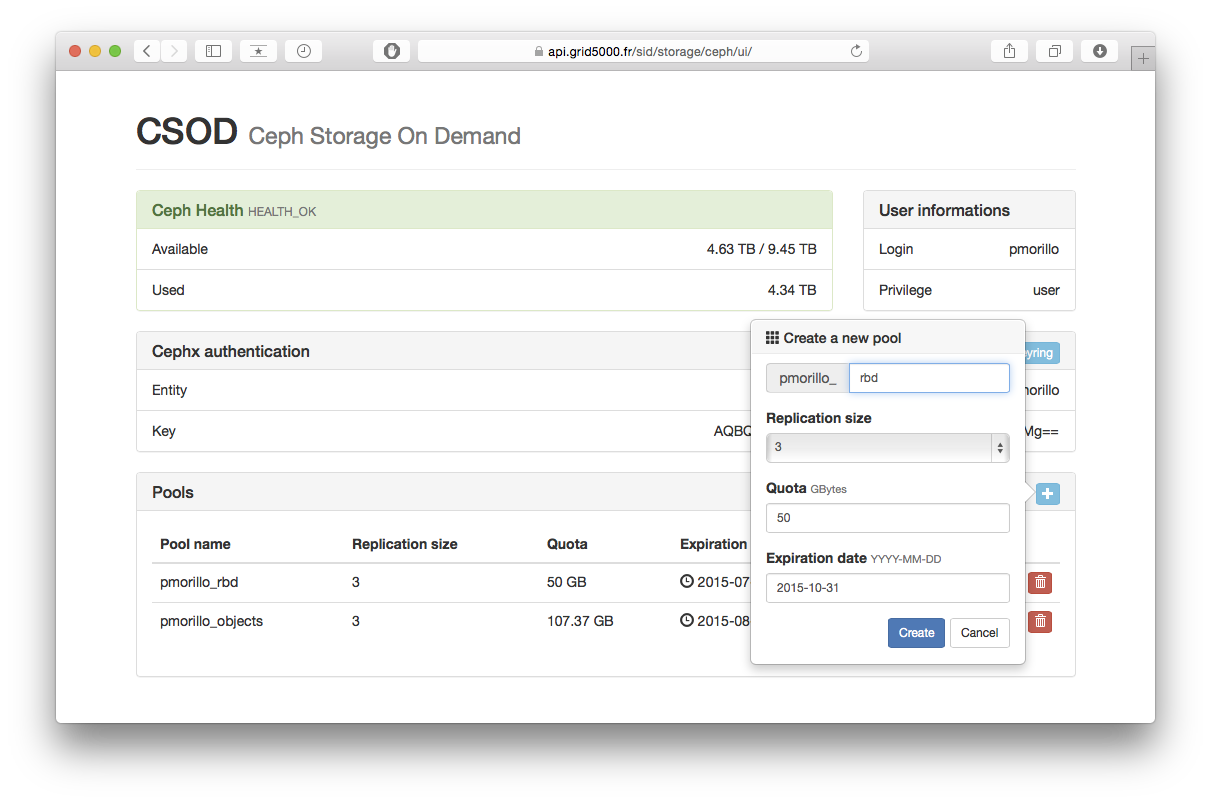Create a persistent database service on Grid'5000 (outdated)
Tagged with Grid5000 - Tutorial - Ceph - KVM
Introduction
Usually on Grid’5000, in order to deploy our own system we use Kadeploy. The lifetime of the system is very short, the duration of the OAR job. To keep system modifications, you need to update the deployed Kadeploy environment before the end of OAR job. This is sufficient in most simple cases, but for systems hosting a lot of datas usable through multiple experiments, it’s not practical.
In this tutorial we will create a persistent system hosting a database, hosted on a node as a virtual machine with KVM. This virtual machine will be stored on the Ceph distributed object store available at Rennes.

Manage your Ceph object store
Generate your Ceph Key and create an RBD pool
On Grid’5000 Ceph UI, click on Generate Ceph key (if no key appears) and create a Ceph pool name username_rbd.

Note : A replication size of 3 is required for a safe storage.
Create the virtual machine stored on a Rados Block Device
Deploy a Debian 8 environment
- From host
frontend.rennes.grid5000.fr:
G5K ❯ /home/pmorillo » oarsub -I -t deploy -l walltime=2
[ADMISSION RULE] Modify resource description with type constraints
Generate a job key...
OAR_JOB_ID=720994
Interactive mode : waiting...
Starting...
Connect to OAR job 720994 via the node frontend.rennes.grid5000.fr
G5K(720994) ❯ /home/pmorillo » kadeploy3 -e jessie-x64-base -k -f $OAR_NODEFILE
...
The deployment is successful on nodes
parapide-9.rennes.grid5000.frInstall and configure Ceph
- Create a shell script
deploy_ceph_client.shon the frontend to install KVM, Ceph and configure Ceph access on the deployed node :
#!/bin/bash
if ! [ -n "$OAR_NODEFILE" ]; then echo "Your shell must be attached to a OAR job" && exit; fi
CLIENTS=$(uniq $OAR_NODEFILE)
CEPH_CONFIG=$(cat <<'EOF'
[global]
mon initial members = ceph0,ceph1,ceph2
mon host = 172.16.111.30,172.16.111.31,172.16.111.32
EOF
)
echo $CLIENT
echo $CEPH_KEYRING
for host in $CLIENTS; do
echo "--> Installed Ceph and KVM on host $host..."
ssh root@$host "apt-get update && apt-get install -y ceph qemu-kvm"
echo "--> Configure Ceph client on host $host..."
curl -k https://api.grid5000.fr/sid/storage/ceph/auths/$USER.keyring | ssh root@$host "cat - > /etc/ceph/ceph.client.$USER.keyring"
echo "$CEPH_CONFIG" | ssh root@$host "cat - > /etc/ceph/ceph.conf"
doneNote: This script will install ceph and qemu-kvm, and generate file /etc/ceph/ceph.conf and /etc/ceph/ceph.client.username.keyring.
- From host
frontend.rennes.grid5000.fr:
G5K ❯ /home/pmorillo » sh deploy_ceph_client.shCreate a Rados Block Device based on Debian 7 (Wheezy)
- From host
frontend.rennes.grid5000.fr:
scp /grid5000/virt-images/wheezy-x64-base-1.4.qcow2 root@parapide-9:/tmp- From host
parapide-9:
root@parapide-9:~# qemu-img convert -f qcow2 -O raw /tmp/wheezy-x64-base-1.4.qcow2 rbd:pmorillo_rbd/debian7-mysql:id=pmorillo
root@parapide-9:~# rbd --pool pmorillo_rbd --id pmorillo ls
debian7-mysqlStart the virtual machine
root@parapide-9:~# screen kvm -m 1024 -drive format=raw,file=rbd:pmorillo_rbd/debian7-mysql:id=pmorillo -nographicConfigure Virtual Machine and MySQL
Set hostname
Here apt-get update command will fail because the system cannot resolve host proxy. SLIRP
does not send by default DNS search field. Add FQDN in /etc/hostname file will quickly solve the problem.
Log in as root/grid5000, and :
root@(none):~# echo "vm-mysql.rennes.grid5000.fr" > /etc/hostname
root@(none):~# sh /etc/init.d/hostname.shConnect through SSH
Shutdown the virtual machine and restart with port forwarding :
root@parapide-9:~# screen kvm -m 1024 -drive format=raw,file=rbd:pmorillo_rbd/debian7-mysql:id=pmorillo -nographic -device e1000,netdev=user.0 -netdev user,id=user.0,hostfwd=tcp::2222-:22From host frontend.rennes.grid5000.fr :
G5K ❯ /home/pmorillo » ssh -p 2222 root@parapide-9
...
root@vm-mysql:~#Install and configure MySQL
root@vm-mysql:~# apt-get update && apt-get install mysql-server
root@vm-mysql:~# mysql -u root
mysql> create database grid5000_test;
mysql> grant all privileges on grid5000_test.* to 'grid5000'@'%' identified by 'grid5000';
Query OK, 0 rows affected (0.00 sec)
mysql> exitEdit /etc/mysql/my.cnf, comment line bind-address = 127.0.0.1 and restart MySQL service :
root@vm-mysql:~# service mysql restart
Stopping MySQL database server: mysqld.
Starting MySQL database server: mysqld ..
Checking for tables which need an upgrade, are corrupt or were
not closed cleanly..
root@vm-mysql:~#Restart VM with MySQL port forwarding
root@parapide-9:~# screen kvm -m 1024 -drive format=raw,file=rbd:pmorillo_rbd/debian7-mysql:id=pmorillo -nographic -device e1000,netdev=user.0 -netdev user,id=user.0,hostfwd=tcp::3306-:3306Test
From host frontend.rennes.grid5000.fr :
G5K ❯ /home/pmorillo » mysql -u grid5000 -h parapide-9 -p frennes.rennes.grid5000.fr 1 ↵
Enter password:
Welcome to the MySQL monitor. Commands end with ; or \g.
Your MySQL connection id is 37
Server version: 5.5.44-0+deb7u1 (Debian)
Copyright (c) 2000, 2014, Oracle and/or its affiliates. All rights reserved.
Oracle is a registered trademark of Oracle Corporation and/or its
affiliates. Other names may be trademarks of their respective
owners.
Type 'help;' or '\h' for help. Type '\c' to clear the current input statement.
mysql> show databases;
+--------------------+
| Database |
+--------------------+
| information_schema |
| grid5000_test |
+--------------------+
2 rows in set (0.00 sec)
mysql>Conclusion
Now you can use a persistent database during multiple experiments.
Network performances are not optimal in this KVM configuration, but it’s very simple to use.
Currently we need to deploy a node with Kadeploy to start the VM, but in a near future,
when production environment will be based on Debian 8 (Jessie), a simple oarsub ./start_mysql_vm.sh and the boot time of the virtual machine (few seconds) will be required.